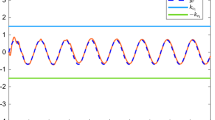Abstract
This paper develops a degradation tolerant approach based on optimal control. Compared to classical control design, the aim of this work is to decelerate the rate of evolution of degradation by minimizing a quadratic cost function of control input, tracking error and rate of degradation. A linear quadratic regulator (LQR) and tracker (LQT) are expanded, in a finite and infinite-horizon, for a discrete-time linear system in presence of degradation of its components. The performance of the systems is affected by the degradation in an affine manner. First, a LQR is developed for finite and infinite horizon, then the structure of a LQT is designed for finite-horizon. By tuning the weighting matrices, the performance of the system in closed loop can be modified so that the system can achieve its mission before the occurrence of component failure and the remaining useful life can be extended. Electro-Mechanical Actuator (EMA) system is widely used in modern automobiles, transportation and industrial processes and is adopted to verify the effectiveness of the proposed control scheme.
Access this chapter
Tax calculation will be finalised at checkout
Purchases are for personal use only
Similar content being viewed by others
References
Blanke, M., Kinnaert, M., Lunze, J., Staroswiecki, M., Schröder, J.: Diagnosis and Fault-Tolerant Control, vol. 2. Springer, Heidelberg (2006). https://doi.org/10.1007/978-3-540-35653-0
Bole, B.M., Brown, D.W., Pei, H.L., Goebel, K., Tang, L., Vachtsevanos, G.: Fault adaptive control of overactuated systems using prognostic estimation (2010)
Brown, D.W., et al.: Prognostics enhanced reconfigurable control of electro-mechanical actuators (2021)
Brown, D., Bole, B., Vachtsevanos, G.: A prognostics enhanced reconfigurable control architecture, pp. 1061–1066. IEEE (2010). https://doi.org/10.1109/MED.2010.5547651
Chamseddine, A., Theilliol, D., Sadeghzadeh, I., Zhang, Y., Weber, P.: Optimal reliability design for over-actuated systems based on the MIT rule: application to an octocopter helicopter testbed. Reliab. Eng. Syst. Saf. 132, 196–206 (2014)
Fu, J., Hazyuk, I., Maré, J.C.: Preliminary design rules for electromechanical actuation systems -effects of saturation and compliances. In: 5th European Air and Space Conference, pp. 1–14 (2015)
Fu, J., Maré, J.C., Fu, Y.: Modelling and simulation of flight control electromechanical actuators with special focus on model architecting, multidisciplinary effects and power flows. Chin. J. Aeronaut. 30, 47–65 (2017). https://doi.org/10.1016/j.cja.2016.07.006
Jha, M.S., Weber, P., Theilliol, D., Ponsart, J.C., Maquin, D.: A reinforcement learning approach to health aware control strategy. In: 2019 27th Mediterranean Conference on Control and Automation (MED), pp. 171–176. IEEE (2019)
Lewis, F.L., Vrabie, D.L., Syrmos, V.L.: Optimal Control (2012)
Noura, H., Theilliol, D., Ponsart, J.C., Chamseddine, A.: Fault-Tolerant Control Systems: Design and Practical Applications. Springer, London (2009). https://doi.org/10.1007/978-1-84882-653-3
Obando, D.J.R.: From deterioration modeling to remaining useful life control: a comprehensive framework for post-prognosis decision-making applied to friction drive system (2018)
Obando, D.R., Martinez, J.J., Bérenguer, C.: Deterioration estimation for predicting and controlling RUL of a friction drive system. ISA Trans. 113, 97–110 (2021). https://doi.org/10.1016/j.isatra.2020.10.013
Pour, F.K., Theilliol, D., Puig, V., Cembrano, G.: Health-aware control design based on remaining useful life estimation for autonomous racing vehicle. ISA Trans. 113, 196–209 (2021)
Salazar, J.C., Weber, P., Nejjari, F., Sarrate, R., Theilliol, D.: System reliability aware model predictive control framework. Reliab. Eng. Syst. Saf. 167, 663–672 (2017)
Stengel, R.F.: Optimal control and estimation (1986)
Author information
Authors and Affiliations
Corresponding author
Editor information
Editors and Affiliations
Rights and permissions
Copyright information
© 2023 The Author(s), under exclusive license to Springer Nature Switzerland AG
About this paper
Cite this paper
Kanso, S., Jha, M.S., Theilliol, D. (2023). Degradation Tolerant Optimal Control Design for Linear Discrete-Times Systems. In: Kowalczuk, Z. (eds) Intelligent and Safe Computer Systems in Control and Diagnostics. DPS 2022. Lecture Notes in Networks and Systems, vol 545. Springer, Cham. https://doi.org/10.1007/978-3-031-16159-9_32
Download citation
DOI: https://doi.org/10.1007/978-3-031-16159-9_32
Published:
Publisher Name: Springer, Cham
Print ISBN: 978-3-031-16158-2
Online ISBN: 978-3-031-16159-9
eBook Packages: Intelligent Technologies and RoboticsIntelligent Technologies and Robotics (R0)



